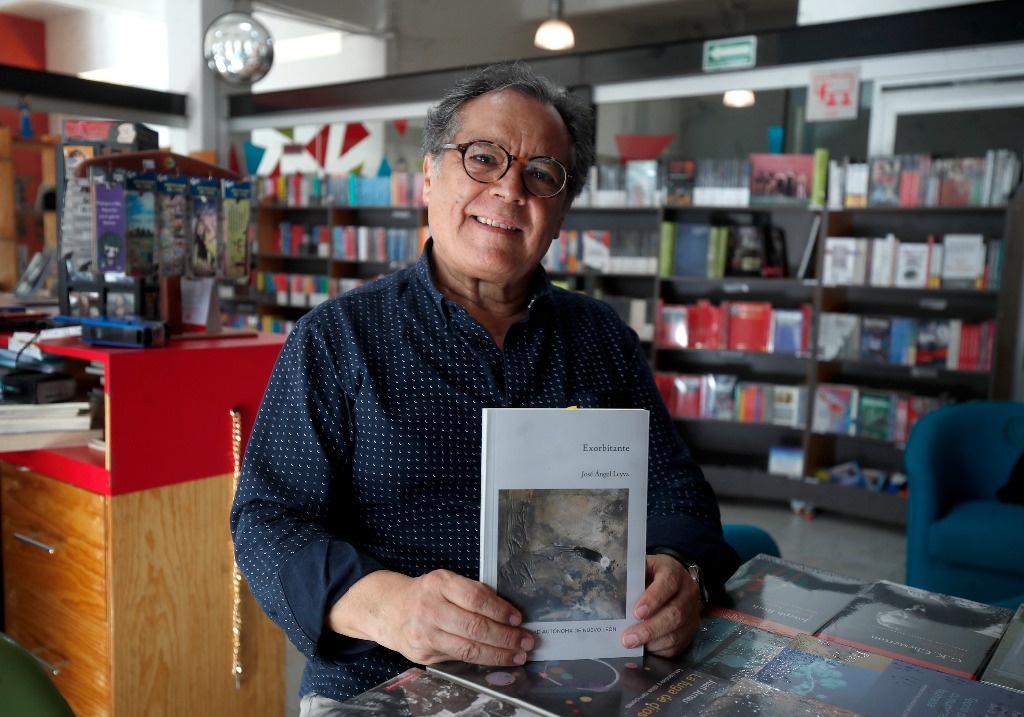The man traveled to the cosmos and from there he sees his insignificance and his human dimension; he questions the ideas of eternity and broke the romanticism with which he saw his meaning and transcendence, especially in art. These reflections gave rise to the collection of poems exorbitant, according to its author, José Ángel Leyva.
The poet, essayist and editor told The Day that Baudrillard wrote that the transcendent man became exorbitant
. That notion made him think that when The ideas of the global village, simultaneity and virtuality begin, there is also a process of trivialization and minimization of the value of life itself, as in Nazism in World War II.
.
Leyva (Durango, 1958) recalled the occasion when he interviewed astronomer Arcadio Poveda and the latter spoke to him about cosmic and geological ages. “I asked him where the history of man is in the history of the cosmos. He told me: ‘It is happening in the last second of the history of the universe.’ That is where it comes from that when man breaks gravity and begins to orbit around his home, he becomes exorbitant.”
The cultural promoter said that in literature, “journalism has served as my compass and this book was born from an interview I did with a cosmonaut in 1997. It took many years for that conversation to settle in my brain and in my sensitivity, and I began to generate a poetic discourse.
“During my conversation with cosmonaut Victor Sabinij, I was struck by the fact that on one of his last trips into space, he was flying over North America from the Mir station and saw a thread of dust coming off of him and winding its way towards Mexico. It was the earthquake of September 19, 1985.
For me, it was a drama, a tragedy in the capital, and for him it was simply a geological phenomenon. He did not realize the human pain. There is also the exorbitance and that dialogue between the micro and the macro, between the earthly and the cosmic.
The poet commented that the interview with Sabinij took place a few years after the fall of the Soviet Union, and he was “bewildered at being born in Georgia or the Urals, I don’t remember, and suddenly seeing that the borders and the map of the world had changed again.
“There is a very important part of that view from above of the geological phenomenon and the passage of history and of which he says: ‘all this conformation of human history, of man’s struggle to survive and wars, has to do with power: the driving force of this entire tragic dimension.’
This is what makes men who fought for utopia change once they have taken over the government and demand that others adhere to their rules and believe in what emanates from their power. That is where the decomposition of ideals comes in. It has to do with that, with a dimension of the history of a century that is falling apart.
Regarding the profusion of questions in his collection of poems, José Ángel Leyva said that it is due to “what the rupture of paradigms poses to us, this historical exorbitance, of the end of the 20th century. We really believed that we were facing the end of history, of borders, of nationalisms and many of those things did not happen. Nationalisms have emerged with greater ferocity.
What did end was a social experience of almost a century, which is also discussed in this book, and which is closely linked to the space race. The questions are why the speed of development of science and technology has been so dizzying. It is a very interesting moment in history, in civilization.
Leyva reflected that People do not ask questions, they act with certainties, and that in some way also has to do with the book, which is a confrontation between scientific, philosophical, artistic and researcher thoughts, and the certainties of dogmas, of the drivers of truth, which can be political, religious and general.
.
He recalled that he was writing the book when “Juan Gelman was ill, and death entered into it with some poems that he dedicated to him. Suddenly I realized that it no longer makes sense, because it involves an issue that has to do with that social fighter who has been a great poet. One night I dream about it and I realize that the book is a divided body. I get up at three in the morning and I tear out that piece. It was like having opened an abdomen and taken out a necrotic body.
“I revisited the text with that perspective, which is why characters like Galileo and Giordano Bruno appear. The first represents the pragmatic vision, that is, he saved his life, because he assumes: ‘the Earth moves around the Sun, think what you want’. Giordano Bruno embodies the hero who is willing to sacrifice his life to prove the truth.”
Leyva emphasized that his collection of poems addressed the problem of How to allow discourse, language, to draw on scientific-technological instruments, historical concepts, philosophical concepts, technical concepts, and at the same time engage in dialogue with the poetic. That was a very difficult part because it could also lend itself to generating an arid discourse, stripped of its sensitivity, and a lot of work had to be done on that.
.
Exorbitant (Autonomous University of Nuevo León) will be presented on October 20 at 6:15 p.m., at the Elvia Carrillo Puerto Forum of the International Book Fair in the Zócalo.
#humanity #broke #gravity #changed #notion #transcendence #Leyva
– 2024-09-01 02:15:27
